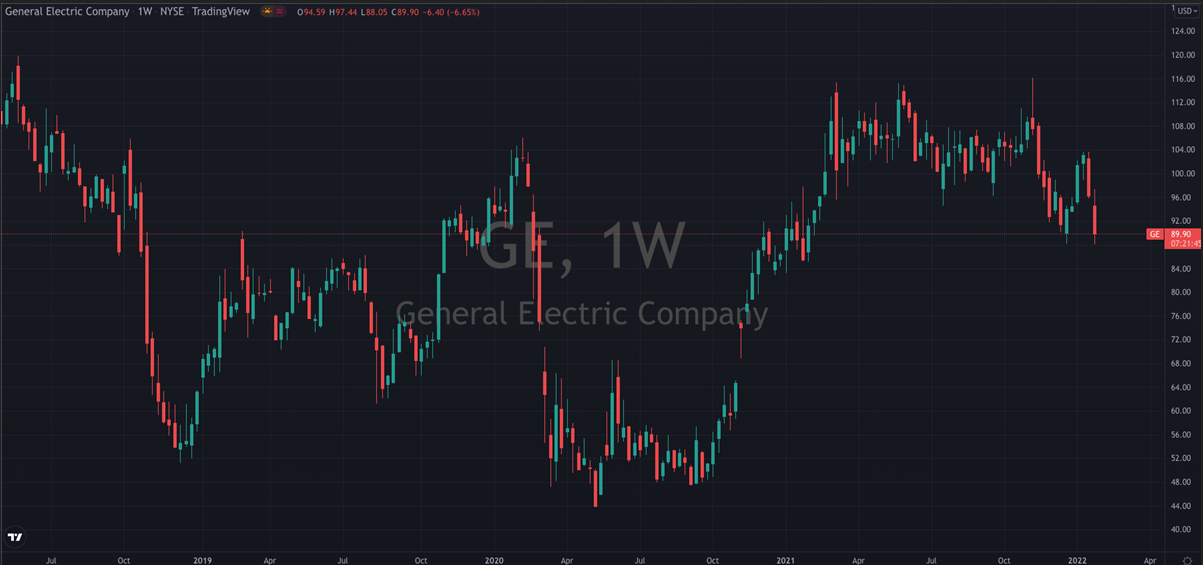Last week’s Q4 earnings from General Electric (NYSE:GE) probably weren’t what the company was hoping for, let alone needed. Shares of the one-time industrial titan have been trading sideways for the past year which isn’t that bad considering the selling that went on before it. Let it not be forgotten, shares of GE once changed hands for more than $450 apiece, a far cry from the $90 they’re currently available for now.
However, with an eye to the future, let’s take a look at the numbers and see what they might mean for GE stock in the months ahead.
For starters, non-GAAP EPS came in slightly higher than expected at $0.92, a beat that couldn’t be replicated on the revenue number which was below analyst expectations. It also showed revenue contracting 3.5% year on year, a key metric that will need to flip if GE is to have any chance of starting an uptrend in the future.
That being said, there were some positive signs such as the company’s margins and cash flow both ahead of the consensus and showing movement in the right direction.
Lower Than Expected Guidance
But any thoughts that this might spark a bid in the stock were quickly dampened by the lower than expected forward guidance issued by management. This is one of the least well-liked signals a company can give investors and it goes a long way to explaining the 10% drop seen in shares since the report was released on Tuesday morning.
The key headwinds facing the company revolve around supply-chain issues, particularly in their healthcare unit, as well as inflation. This latter point is said to be having a significant adverse effect on the company’s onshore wind business due to the rising cost of transportation and commodities like steel.
In response to the report and subsequent drop in shares, the likes of JPMorgan and RBC have re-examined their ratings on the company. Stephen Tusa from the former flagged “an operating miss on revenue, profit and orders” which he believes “indicates that revenue guidance will be a challenge to meet given weak orders.” Ultimately he added, "a miss is a miss" whether or not EPS disclosure changes result in guidance that is like for like with Street forecasts.
His counterpart at RBC, Deane Dray, struck a slightly more optimistic note and maintained his Buy rating on GE stock. Given changes to disclosure, Dray says that weaker than expected 2022 EPS guidance ($3.2/s vs. Street at $3.9) is not 'like-for-like', and that the focus should be on free cash flow, where 2022 guidance shakes out at around $6 billion, which is still above the Street estimate of $5.2 billion. This also suggests a fairly attractive 6% free cash flow yield.
Considering Getting Involved
Still, GE is down about 20% from its November high, which at the time looked like it was about to be the start of a steady rally higher. To put that into context, not only are GE shares back trading where they were this time last year, but also where they were near the depths of the 2008 crash, as well as in 1995.
It’s scary to think that you could have bought GE just as the first Toy Story movie was hitting cinemas around the world, for the same price it is now. To be sure, a lot has happened in the meantime and recent spin-offs and splits have changed the face and direction of the company, but it does carry that bit of a whiff with it.
For all that though, the vast majority of analyst ratings on the stock are a Buy. Of the 21 fresh analyst updates that have been made to GE stock in the past 90 days, 6 say it’s a Buy, 9 say it’s a Strong Buy.
But given the lackluster performance of late, coupled with this earnings miss, it’s hard to want to buy into GE on those ratings alone. However the quarter may yet come where they knock it out of the park, and when they do, Wall Street is sure to remember this is still a $100 billion market cap company that knows how to get up a head of steam.

